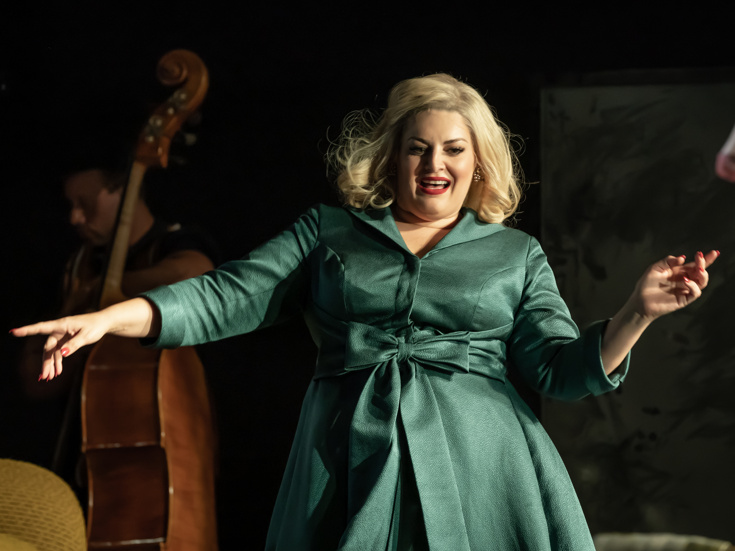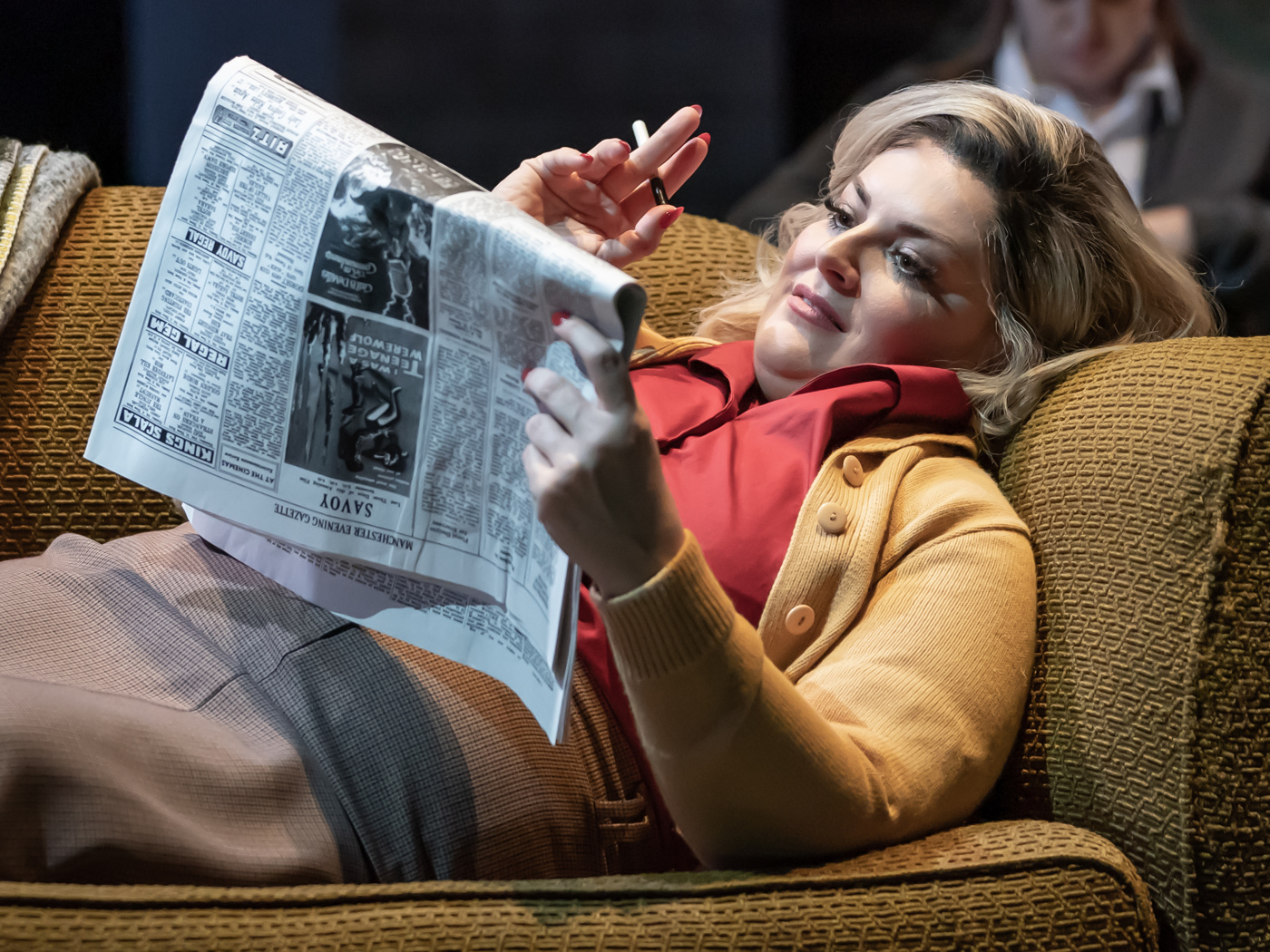Jodie Prenger on Starring in London's A Taste of Honey and Naming Her Pet After a Fabulous Diva

(Photo: Marc Brenner)
Jodie Prenger came to attention as the winner of the BBC reality TV competition series I’d Do Anything in 2008, as a result of which she got to play Nancy in Oliver! in the West End for the producer Cameron Mackintosh. Since that time, she’s played Mme. Thenardier in Les Miz in Dubai, as well as starred in such iconic titles as One Man, Two Guvnors, Tell Me on a Sunday and Shirley Valentine and, now appearing at the Trafalgar Studios in the West End revival of Shelagh Delaney’s landmark 1958 play A Taste of Honey. Broadway.com caught the ever-ebullient Prenger as she was settling into her new West End home to talk about timeless plays, career aspirations and one Broadway legend whom the 40-year-old Englishwoman especially admires.
How do you feel about bringing this time-honored play into the West End, following a U.K. tour?
It's just so exciting to be playing Helen, given the history of who she is and where she comes from and the piece itself. I remember seeing the film [made in 1961, with Dora Bryan as Helen] many moons ago, and I saw the National Theatre revival on video [with Lesley Sharp in Prenger's current role]. We had the most wonderful thing happen when Charlotte Delaney [daughter of the playwright, Shelagh] came to see it and told us that it was like hearing her mum's voice ringing in her head. It felt like such an honor to know that we'd got close to what her mum wanted. That's what you want when you play these two British classics—to adhere to the spirit of the original.

(Photo: Marc Brenner)
Do you feel any sort of personal resonance with the play?
My family was from Manchester [where the play is set], and though obviously we weren't dealing with alcoholism, it was still an environment where you had to graft [work hard] within an inch of your life to survive. I could hear the voice of my [grandmother] throughout the play, and though she wasn't around to see me in it, I felt connected to the musicality of it and to the way Shelagh Delaney captures the heartbeat and the language of the people of Manchester.
Does the play feel ahead of its time in its candid depiction both of an interracial relationship and of homosexuality?
I remember watching a documentary where the original cast were told where the exits were in case they got mobbed because the subject matter was so taboo at the time. And to think that we still deal with those issues today: we haven't been told where the exits are, but it's good to keep these issues alive. I think the play is a masterpiece in the way it leaves you wanting to know more or questioning your own beliefs.
How has it been working with Gemma Dobson, who plays Jo [Helen’s daughter], since the two roles together make up such a potent double-act?
The funniest thing is that probably a month before we got cast, I was presenting an award to Gemma and we got on like a house on fire. Then there I was walking into the National Theatre to audition for Helen and there was Gemma going in for Jo—the two of us, one straight after the other. There were other people up for both parts, so I can tell you that there were tears shed when I found out that I had got the role and that Gemma had, too.
Is this an exhausting play to do?
Some of the feelings are very raw, but the thing about it is that we all want to be loved and to fight another day and to have our taste of honey. The play may occupy a different moment in time, but these feelings are universal; you can’t ever dispute that.
But you’re able to leave Helen behind after each performance?
Some of the emotions in this play really get me, and that’s a good thing if you can allow your character to physically and emotionally take you there. But at the same time, as with anything, you’ve got to kind of leave it at the door; you don’t want to be defined by the piece.
How has it been taking on so many beloved English roles, whether it’s the lovesick Englishwoman abroad in New York in the musical Song and Dance or Beverly in Mike Leigh’s Abigail’s Party or, now, Helen?
I get very daunted, but, at the same time, these are all roles that have a kind of gravitas behind them so there’s an excitement that comes from rolling your sleeves up and getting stuck into the different parts.
Have you noticed that none of these women is exactly, um, shy about letting the audience know what she thinks?
[Laughs] I think it’s fair to say that I won’t ever have the word “wallflower” on my CV: these are definitely not meek or mild women. I mean, I’d love to try some quiet character maybe from a play by Chekhov, but I don’t think I’d be very good at it!
Have you ever imagined what it might be like to have all these characters over together for dinner?
I’m sure it would be one of those parties that goes till the break of dawn: I’d better get my order from [U.K. wine retailer] Laithwaite’s in pretty quick!
Do you have other great ladies of dramatic literature on your bucket list?
Definitely on the back of Abigail’s Party I thought I’ve got to play Martha in Who’s Afraid of Virginia Woolf? Funnily enough, I just finished reading [Edward Albee's play] again, and that would be absolutely fantastic.
How would you feel about following in a role once played by Elaine Stritch?
Oh God, I just adore Elaine Stritch and miss her so much. I’ve been thinking of her one-woman show as I climb up and down backstage here [at the Trafalgar]. I love her line, “As the prostitute once said, ‘It’s not the work, it’s the stairs.’”
Thoughts of Ms. Stritch lead to musicals and to your leap to fame as Nancy in Oliver!, which all happened via reality TV. How does that period of your life seem now?
At times it feels like a decade or more ago, which it was, and at other times as if it were yesterday. What all that did was literally give me that foot in the door that I had always wanted, and I’m very grateful for it. At the same time, that's the moment is when the work—what I call the hard graft—really starts.
How does it feel with this London run scheduled through February to be away from your home up north?
The only downside is that I won’t get back as much as I would like to where I live in Lancashire, which is about 40 minutes away from Salford, where our play takes place. I do miss my animals, I must say.
What sort of menagerie are we talking about?
You know, I’ve actually lost count! There are four rescue cows and seven rescue dogs and two rescue cats and 30-odd chickens and a parrot named Liza—
Liza? Named for Ms. Minnelli?
[Laughs] Of course! Her second name is “with a Z” —of course!
Can’t you take a leaf from the Elaine Stritch diva playbook and insist upon backstage access, at least for some of the barnyard?
It is amazing some of the diva stories you hear, but I just think it’s great to have a delightful company to play with so there are no divas allowed—unless it’s me demanding that I have with me my pet chickens!